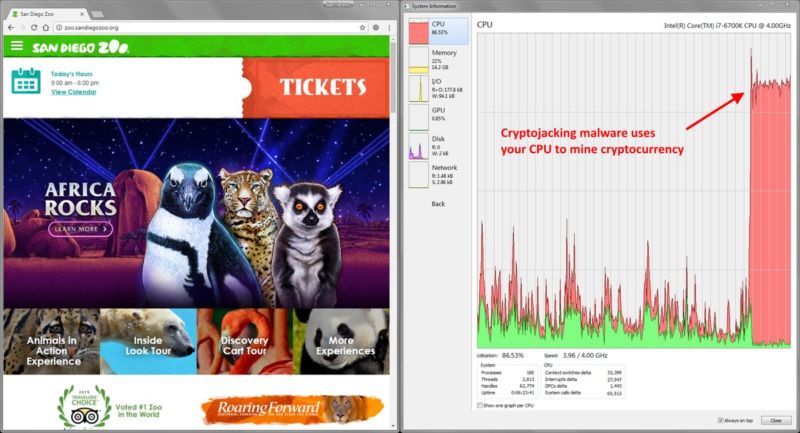INSUBCONTINENT EXCLUSIVE:
Enlarge / Not the experience you wanted from the San Diego Zoo website
(credit: Troy Mursch)
A mass hacking campaign that targets a critical vulnerability in the Drupal content management system has converted
more than 400 government, corporate, and university websites into cryptocurrency mining platforms that surreptitiously drain visitors'
computers of electricity and computing resources, a security researcher said Monday.
Sites that were hacked included those belonging to
computer maker Lenovo, the University of California at Los Angeles, the US National Labor Relations Board, the Arizona Board of Behavioral
Health Examiners, and the city of Marion, Ohio, Troy Mursch, an independent security researcher, told Ars on Monday
The Social Security Institute of the State of Mexico and Municipalities, the Turkish Revenue Administration, and Peru's Project Improvement
of Higher Education Quality were also affected
The US had the largest concentration of hacked sites, with at least 123, followed by France, Canada, Germany, and the Russian Federation,
with 26, 19, 18 and 17, respectively.
The sites all ran the same piece of JavaScript hosted on vuuwd.com
The highly obfuscated code caused visitors' computers to dedicate 80 percent of their CPU resources to mining the digital coin known as
Monero with no notice or permission
The attacker behind the campaign took control of the sites by exploiting a Drupal vulnerability that makes code-execution attacks so easy
and reliable it was dubbed "Drupalgeddon2." Although Drupal maintainers patched the critical flaw in March, many vulnerable sites have been
The lapse touched off an arms race among malicious hackers three weeks ago.
Read 5 remaining paragraphs | Comments

